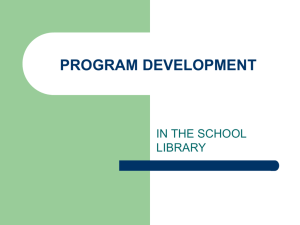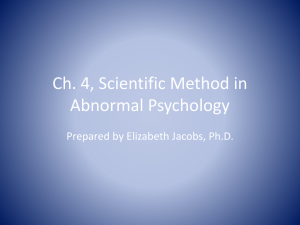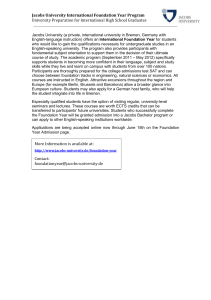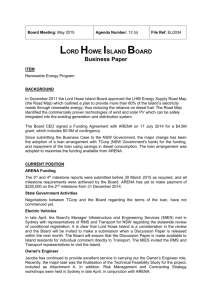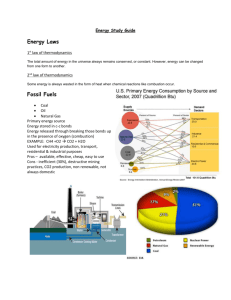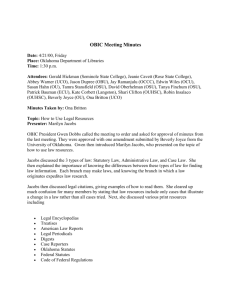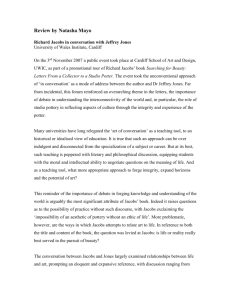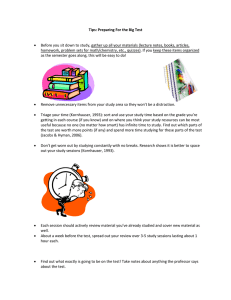Phy Sci 378 syllabus
advertisement
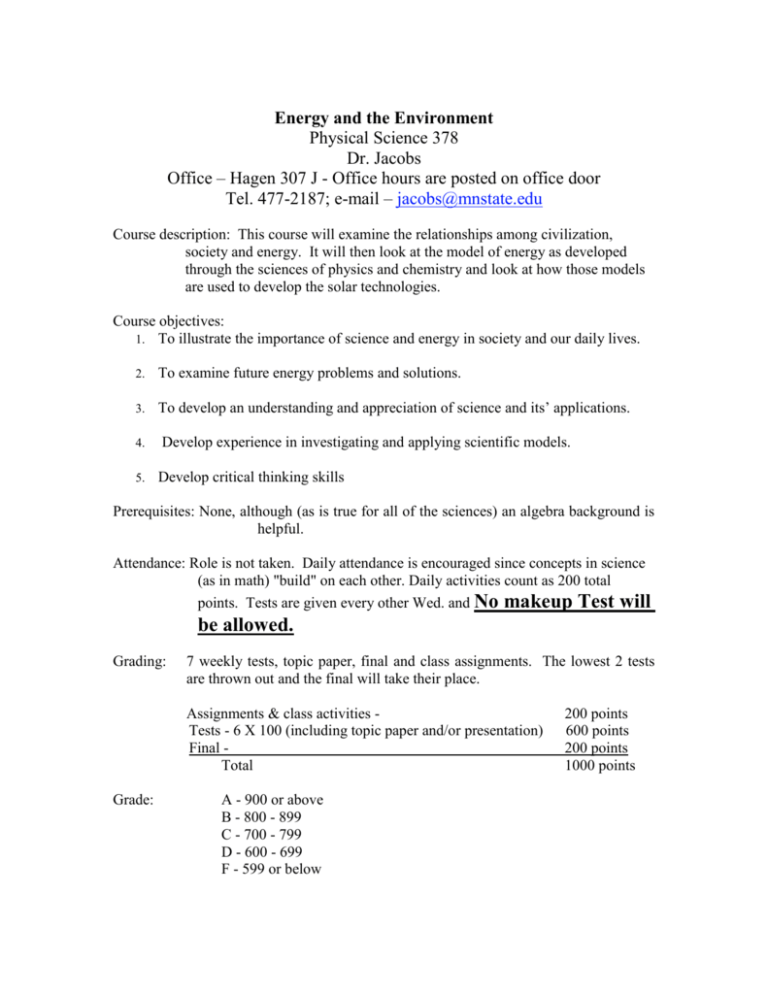
Energy and the Environment Physical Science 378 Dr. Jacobs Office – Hagen 307 J - Office hours are posted on office door Tel. 477-2187; e-mail – jacobs@mnstate.edu Course description: This course will examine the relationships among civilization, society and energy. It will then look at the model of energy as developed through the sciences of physics and chemistry and look at how those models are used to develop the solar technologies. Course objectives: 1. To illustrate the importance of science and energy in society and our daily lives. 2. To examine future energy problems and solutions. 3. To develop an understanding and appreciation of science and its’ applications. 4. 5. Develop experience in investigating and applying scientific models. Develop critical thinking skills Prerequisites: None, although (as is true for all of the sciences) an algebra background is helpful. Attendance: Role is not taken. Daily attendance is encouraged since concepts in science (as in math) "build" on each other. Daily activities count as 200 total points. Tests are given every other Wed. and No makeup Test will be allowed. Grading: 7 weekly tests, topic paper, final and class assignments. The lowest 2 tests are thrown out and the final will take their place. Assignments & class activities Tests - 6 X 100 (including topic paper and/or presentation) Final Total Grade: A - 900 or above B - 800 - 899 C - 700 - 799 D - 600 - 699 F - 599 or below 200 points 600 points 200 points 1000 points Course Outline Text: From MacEnergy to EcoEnergy - By Dennis Jacobs and Karen Branden Week 1 & 2 – Energy Basics - Chapter 1 – World Energy Overview Lab on Units of energy - Definitions First and Second Law of Thermodynamics Week 3 – Lecture When Coal was King – The Beginning of the Hydrocarbon Revolution Lab on Work Energy and Power Week 4 – Chapter 3 - How We Got Here – The Evolution of Petroleum Species Lab on conservation of Energy - Laws of Thermodynamics Week 5/6 – Chapter 4 Rise of the Utilities – Natural Gas and Electricity Lab on Electricity Week 7/8 Chapter 5 It’s All About Energy Lab/ Discussion on the Steps in the Energy Process Weeks 9/10 Lecture - The science of alternative solar technologies What is solar energy (look at the various forms) Direct Solar (heat) - Lab on design of and determining efficiency of flat plate collector (why a certain design?) Direct Solar (photo voltaic) - Lab on efficiencies (limits to a design) Wind - efficiencies of wind systems - slide show on design and application Water (hydroelectric) - Potential and kinetic energy in rivers and tides. Determine potential for power output of Red River Dam. Biomass - Chemical energy in wood and agricultural by-products Weeks 11 - Chapter 6 - Environmental Consequences of Present and Future Energy Sources Trip to Jacobs/Branden House Week 12-13 Chapter 7 – Where Do We Go? How Do We Get there. Lab/Discussion on Future Energy Scenario Trip to Moorhead Wind systems Week 14 – 15 Student Presentations Topic Paper for Energy and the Environment Choose any topic in Energy you are interested in and write a three page paper on that topic. Use APA format. (see Dr. Jacobs or one of the writing teacher for info on the APA format) The body of the paper must be a minimum of three pages. Not 2, not 2 ½ , but a full three pages. At least 15 points will be deducted from the score if it is not three full pages. Use standard (Times New Roman) #12 type and double space. Use no larger spaces between paragraphs. A bibliography page must be included at the end of the three pages (not included in the three pages). The sources must include at least three library sources (books or journals). You may also use web sources. If you want the instructor to proof read the paper, hand in the rough copy at least three weeks before the end of the semester. If you are not a strong writer go to the Write Site for help. Grammar and spelling will be considered in the grade for the paper. The final paper is due the last week of regular classes. Disability statement “Students with disabilities who believe they may need an accommodation in this class are encouraged to contact Greg Toutges, Coordinator of Disability Services at 477-5859 (Voice) or 1-800-627-3529 (MRS/TTY), CMU 114 as soon as possible to ensure that accommodations are implemented in a timely fashion.”
